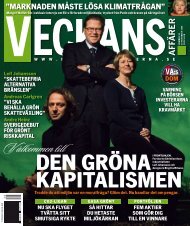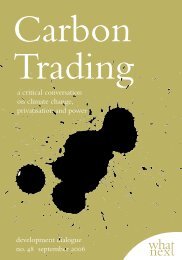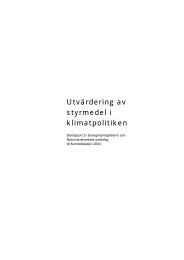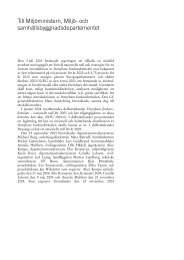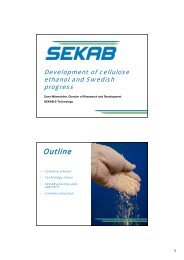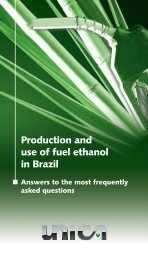Sugarcane ethanol: Contributions to climate change - BAFF
Sugarcane ethanol: Contributions to climate change - BAFF
Sugarcane ethanol: Contributions to climate change - BAFF
Create successful ePaper yourself
Turn your PDF publications into a flip-book with our unique Google optimized e-Paper software.
Chapter 5<br />
Table 11. Continued.<br />
Criterion NL UK GE RTB EU<br />
4. Environment (continued) ✓ ✓ ✓ ✓<br />
d) Preventing erosion and deterioration of the soil <strong>to</strong> occur<br />
and maintaining the fertility of the soil<br />
✓ ✓ ✓ ✓<br />
e) Active improvement of quality and quantity of surface and ✓<br />
groundwater<br />
✓ ✓<br />
f) Water use efficiency of crop and production chain ✓ ✓<br />
g) Emissions <strong>to</strong> the air ✓ ✓<br />
h) Use of genetically modified organisms ✓ ✓<br />
Source: adapted from Van Dam et al. (2006).<br />
NL = the Netherlands; UK = United Kingdom; GE = Germany; RTB = Round table on sustainable<br />
biofuels; EU = European Union.<br />
While the above concerns are well-justi�ed, some criticism of biofuels and their impacts are<br />
motivated by protectionism and interest in agricultural subsidies and agribusiness production<br />
chains in several developing countries, especially from EU countries. Certi�cation schemes<br />
suggested may become non-tari� barriers, rather than environmentally and socially sound<br />
schemes.<br />
Scienti�c and technological assessments comparing di�erent kinds of biofuels are needed <strong>to</strong><br />
reduce the play of such interests and <strong>to</strong> establish the strengths of best potential of biofuels<br />
along with their dangers and limitations.<br />
�e OECD’s latest report on biofuels illustrates how fears can be perpetuated without proper<br />
scienti�c basis. Suggestively titled: (‘Biofuels: is the cure worse than the disease?’), the report<br />
stated: ‘Even without taking in<strong>to</strong> account carbon emissions through land-use <strong>change</strong>, among<br />
current technologies only sugarcane-<strong>to</strong>-<strong>ethanol</strong> in Brazil, <strong>ethanol</strong> produced as a by-product<br />
of cellulose production (as in Sweden and Switzerland), and manufacture of biodiesel from<br />
animal fats and used cooking oil, can substantially reduce [greenhouse gases] compared with<br />
gasoline and mineral diesel. �e other conventional biofuel technologies typically deliver<br />
[greenhouse gas] reductions of less than 40% compared with their fossil-fuel alternatives’.<br />
�is report also recognized that while still trade barriers would persist <strong>to</strong> the international<br />
market, it will be di�cult for the world <strong>to</strong> take advantage of the environmental qualities of<br />
the use of some biofuels, mainly the <strong>ethanol</strong> form sugarcane and so forth as international<br />
markets are not yet fully created for biofuels.<br />
134 <strong>Sugarcane</strong> <strong>ethanol</strong>



